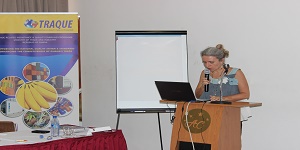 National Quality Policy for Ghana, EU Programme Officer, Ms Delphine Aupicon
National Quality Policy for Ghana, EU Programme Officer, Ms Delphine Aupicon
Ghana’s quality infrastructure would be enhanced with a National Quality Policy in place, the Trade Related Assistance and Quality Enabling (TRAQUE)Programme has assured.
At a consultative workshop on the draft National Quality Policy for Ghana, Ms Delphine Aupicon, EU Programme Officer, said to expand international trade, countries cannot underestimate the importance of adopting and implementing internationally recognised and accepted quality practices.
“These activities provide a vital link to global trade, market access and export competitiveness as they contribute to consumer confidence in product safety, quality, health and the environment,” Ms Aupicon said.
As markets continue to be progressively globalised and shaped by technological developments, governments are increasingly reconsidering the overall arrangement of their national quality infrastructure.
It is in light with this that the TRAQUE Programme issupporting the Ministry of Trade and Industry to boost the National Quality Infrastructure with a substantial and comprehensive National Quality Policy which embraces the role and responsibilities of facilitating trade, enhancing exports as well as accelerating economic growth.
Ms Aupiconnoted that international exporting is a very dynamic affair and if Ghana wants to continue exporting, it would need to constantly update trade standards and acquire the capability to conform to the increasing number of new regulations.
“It is in view of this that both the Industrial and Trade Policies prescribe the formulation of a quality policy to coordinate all elements of the National Quality Infrastructure to ensure the supply and usage of compliant goods and services,” she noted.
According to the Programme Officer, the formulation of this Policy needs to be accomplished through a comprehensive and inclusive process, based on analysis and wide consultations with stakeholders, in order to ensure that the Policy is broad-based and embraced by all stakeholders.
The exercise has been carried out over a period of aboutseven years starting with a report on Standards, Quality Assurance and Metrology commissioned by the Ministry of Trade and Industry in 2008. This was followed by a review of Ghana’s quality infrastructure leading to a comprehensive report and a draft policy in 2009.
The Policy has however been reviewed with regards to the changes in the general quality infrastructure over the period spanning 2009 to 2015.